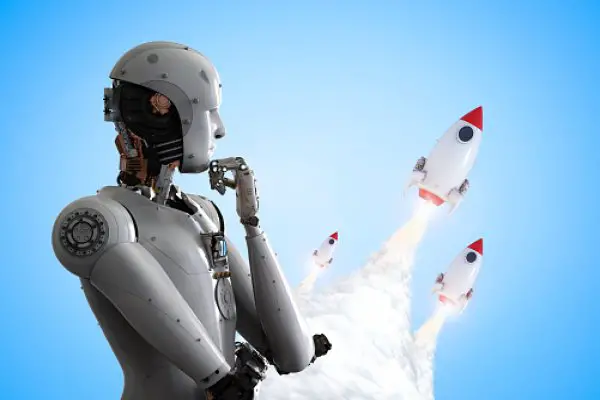AI has been a hot topic ever since it became possible. It is heralded as the most important invention since the printing press, and it has been seen in various lights – beneficial, daunting, and ingenious. However, some fear that artificial intelligence will eventually take control of us.
ChatGPT, a revolutionary AI chatbot, is gaining immense popularity in education. It is being hailed as a way for teachers to streamline their lesson plans and focus more on individualized student needs instead of the standardized curricula.
People have expressed distress over the fact that artificial intelligence (AI) systems can create essays that closely mimic those written by humans – and, to make matters worse, score highly on standardized tests leading to potential qualification for educational degrees.
ChapGPT, which is unimaginable to most adults, and its successors have the potential to radically change the educational sector and transform schooling as we know it.
Today’s preschoolers – AI natives – may employ technology with increasing sophistication, potentially upsetting the well-established top-down model of adult-controlled schooling with its associated tests and curriculums and demonstrating it as a facade.
In a span of just a few years, the structure of the current school system and its methods of teaching and learning will be exposed to be merely used as a mechanism to make young people compliant enough to enter into their respective occupations eventually – something that has very little to do with actual education.
While “artificial intelligence” is a marketing term, it is artificial and doesn’t have much potential to be truly intelligent. We must be concerned that a malicious AI system can be created, which could lead to harmful results, such as physical damage or psychological manipulation.
Computer scientists have long stressed the “A” of Artificial Intelligence (AI) while neglecting the “I” that symbolizes an actual human-like intelligence. This will likely continue because what computer scientists call “intelligence” falls far short of understanding the scope and depth of human intelligence.
Learning is the key to developing Artificial Intelligence (AI) as it allows the computer to adapt when interacting with its environment. Intelligence is derived from the mind and is possible through this adaptation. AI developers attempt to create a machine that can learn and evolve independently.
AI systems are certainly beginning to achieve their goal of possessing a degree of intelligence. Still, the major impediment to true intelligence emerging is that no real “mind” governs it – unlike in creatures such as humans, where the mind precedes learning and adaptation.
Our understanding is growing to show that all our thinking originates from our emotions and feelings. In particular, our emotions are the driving force behind how we perceive and process information. We now recognize that this emotional response occurs before any rational thinking occurs.
Evolutionary survival has played a significant role in developing emotions and feelings, such as avoiding pain, satisfying hunger, procreating, and avoiding toxic food. According to Antonio Damasio, a renowned neuroscientist, these survival instincts led to the emergence of the mind.
All learning originates from emotion, which is first induced through sensory experience. This could be something seen, heard, smelled, tasted, or felt, leading to a physical response like sweaty palms, an accelerated heartbeat, or hunger. This, in turn, results in a behavioral outcome such as cognitive reasoning.
The AI’s name is misleading since it fails to recognize the inseparable link between mind and body. This idea of trying to save the minds of great people by preserving their heads is reminiscent of a popular science fiction trope.
Our bodies are the source of our minds, not solely our brains: it is undeniable that a mind cannot exist without a body. In other words, we are not merely “houses” for brains; our whole body is our brain.
AI is not intelligent in the way humans are, at least not yet; it could end up being either wonderful or horrifying in the future.
A human mind can’t be transferred into a bat or octopus because the evolution of their bodies has led to the development of distinct intelligence, which we cannot comprehend. Science writer Ed Yong raises this point in his book An Immense World.
It’s possible that humans could survive for another million years and, through computer husbandry, evolve an entity with the necessary survival instincts and sensory abilities for genuine intelligence to emerge. However, I’m not expecting it to happen.
I’m taking the time to champion ChatGPT and its promising ability to uncover the ludicrousness of our current educational system. With ChatGPT, I anticipate a bright future of insight and recognition for how outdated our methodologies are.
No matter what, it is impossible to be certain about any of these interpretations. Likely, they are all based on fantasy, with increased speculation and exaggeration. So, this being said, take everything with a pinch of salt – no one can be sure of the truth.
Human intelligence will always remain superior to artificial intelligence because computers never do anything for fun. Pondering this concept is enjoyable to me in itself.
While AI is a powerful tool that can assist us in many ways, it will never be able to replace the unique capabilities of human intelligence. We must continue to recognize and value the strengths of human intelligence and invest in developing it further, both for our personal growth and for the benefit of society as a whole.
Source: teachertomsblog.blogspot.com



